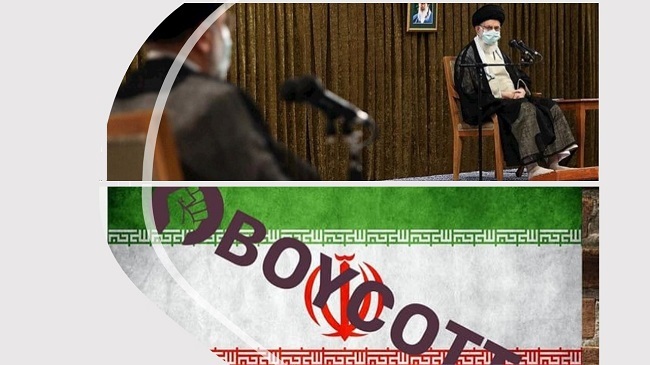Even though the Iranian regime’s own analysts recognize that the presidential elections earlier this month were widely boycotted, the country’s leaders are trying to save face and put a positive spin on the situation.
On Monday, June 28, 2021, Supreme Leader Ali Khamenei met with judiciary officials and described the election, which 90% of the population boycotted, as “epic”. Even if you believed the regime’s claims that 50% of the country voted, which is much lower than the regime’s claims in previous years, how could that be considered epic?
He claimed: “At least 10 per cent of those who didn’t participate were due to the coronavirus situation, and if we take that into consideration, the turnout would be 60 per cent, which is a good figure.”
Of course, the reality is that, as the Iranian Resistance documented through videos and pictures of empty polling stations, turnout was under 10% thanks to a nationwide campaign. Even the interior ministry advised that many of the ballots were invalid, which could mean that people intentionally spoiled their ballots.
The campaign was started by the Resistance, but then it became the rallying cry during protests by all sectors of society over the past couple of months, with demonstrators chanting “We will not vote” before the regime even declared which candidates they allowed to run for election. The families of executed protesters posted videos on social media where they said “My vote is regime change”.
Even outgoing president Hassan Rouhani acknowledged a low turnout in a June 24 cabinet meeting, stressing that it is more concerning that this happened despite Khamenei’s pleas for people to vote.
The Iranian Resistance wrote: “The regime is faced with an increasingly restive society that no longer tolerates the rule of the mullahs. This anger and frustration at the outdated religious tyranny ruling Iran have manifested itself in numerous rounds of nationwide protests in which the people called for the overthrow of the regime. And it has more recently manifested itself in the unprecedented boycott of the elections.
The people of Iran have unequivocally voiced their opinion in their slogan that none of the factions in the regime, the so-called “reformists” and “hardliners,” can solve the country’s and the people’s problems… These realities also manifest themselves in expanding protest movements in the first week after the election. There’s no doubt that down the road, there will be another great—and perhaps final—standoff between the people and the regime.”
